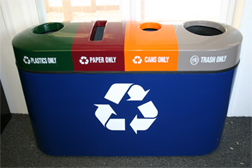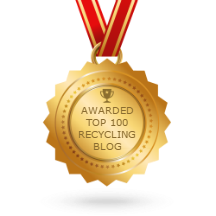We all grew up with the old mantra: Reduce, Reuse, Recycle—your checklist for sustainable living. But recycling is the final item on that list for a reason. When it comes to electronics, recycling should be the last option. Not the first.
Last year, 1.75 billion phones were sold to consumers around the world. By the end of 2013, another 240 million tablets and 207 million PCs will be produced and shipped globally. Seamless plastic and sleek aluminum covers belie the messy origins of our favorite gizmos.
The laptop on your desk, the cell phone in your back pocket, and the tablet on your nightstand all house within them materials wrested from a reluctant earth—things like cobalt, cadmium, nickel, lead, copper, and gold. A single cell phone, for example, is composed of between 500 to 1,000 different components—some sourced from countries that aren’t particularly well-known for safe mining practices, human rights, or environmental standards.
As the demand for gadgets increases, so do raw material extraction rates. In the last 10 years, iron ore production has increased by 180%, cobalt by 165%, and lithium by 125%. Every year, mining operations have to go deeper into the earth, producing more waste for less raw materials. Copper ore deposits, for example, are only one-tenth the purity of the ore mined 100 years ago. Mining and producing just an ounce of gold creates approximately 80 tons of waste.
No matter what manufacturers try to tell you, there is no such thing as a green electronic.
Repair is better than recycling. Way better. Repair extends the life of electronics. It keeps things out of landfills, and out of shredders. Every cell phone repaired is one less that needs to be manufactured. Every laptop saved from the shredder lessens the strain on already overtaxed finite resources. Every computer upgraded can go on to a second, third, or even a fourth user before it really needs to be recycled.
So don’t drop off your broken phone or your old computer at the corner e-waste drive. Repair it. Then keep using it, or give it away. And know that you’ve done something real, something tangible in the fight for a resource-effective future.
But when you are ready to collect & recycle items such as batteries, clothing or plastic bottles & aluminum cans, you organization might want to consider Fibrex Group’s Profile 3 recycling container.
The Profile 3 recycle bin provides the user with a clean, organized recycling set-up which is clearly identified as not being a trash receptacle. The P3 has become very popular for many public drop-off locations for various organizations & charities. The possibilities are endless.
Segments originally posted by: Elizabeth Chamberlain and Kyle Wiens of iFixit
Green Recycling Products Blog
Do Mother Nature a big favor: DON’T Recycle your Broken Electronics
Let Fibrex Help Green Your Business
The Green Business Bureau reports that a new study from the nonprofit, Green America, shows that a record number of small businesses are going green.
Some of the survey's findings include:
- The green economy is growing much faster than the traditional economy
- 79% of companies strongly agree that green products and services give them a competitive advantage
- 75% of companies who sell green products and services saw an increase in sales during the recession
Those are just some of the reasons that Intuit reports sustainability will become a "competitive requirement for small businesses within the next 10 years." Are you prepared or getting left behind? Fibrex Group can assist you with these efforts. With our extensive line of of recycling containers and site furnishings made from recycled materials, it’s a no-brainer for your business and your budget. We have been a sustainable products leader for over 20 years, and can even assist in designing custom graphic units for your corporation.
Green business certification will help you save money, increase sales and engage your employees - all while protecting the environment! Fibrex Group can help you achieve your green or LEED initiatives. For more information, contact us.
Office Plastic Recycling Tips
 It is important to understand what happens to old plastic in order to understand what will happen if you do not recycle plastic.
It is important to understand what happens to old plastic in order to understand what will happen if you do not recycle plastic.
Low Rate of Plastic Recycling
The recycling of plastics is growing along with the recycling statistics of glass and paper; however, only a small percentage of all plastic is recycled. The EPA reports that only 6.8% of all plastics were recycled in 2007 as compared to the 50% of all paper which was recycled.
The reasons for this low rate of recycling tend to center around the inability to recycle all types of plastic in community recycling programs. For example:
- Not all types of plastics are accepted by community recycling programs
- Plastic bags are typically not accepted in recycling programs
Community Recycling
According to the American Plastics Council (APC), about half of all communities in the United States have recycling programs for plastics. Some communities have curbside recycling while other communities require their citizens to bring their recyclables to drop-off recycling points within the community. Some communities accept all types of materials for recycling while others limit the types of plastics they accept. However, almost all grocery stores offer recycle bins which allow patrons to recycle their plastic grocery bags. Those grocery stores who do not offer this service should.
Plastic Bags
Most communities do not accept plastic bags in their curbside or drop-off recycling programs. Of the billion plastic bags given out each day, only 1 to 3% are being recycled. Most employees bring lunches, or other items to work in plastic grocery bags. You could help your employees recycle these bags by providing a plastic grocery bag recycling container at the office.
Some recycling programs only accept plastic bottles made from PET or HDPE, leaving the other plastic items to be tossed into the garbage. Help you employees recycle those plastic bags that don’t make into the traditional recycling bins.
When plastic is not recycled it ends up in the landfill becomes waste in the environment. Without recycling, this "wasted" plastic cannot be reworked and reused. Instead, "new" plastic must be made, requiring the use of natural resources.
For more information on plastic botlle & bag recycling centers, contact the Fibrex Group.
Green Living
1

Recent Posts
Archive
- May 2022 (1)
- April 2020 (1)
- March 2020 (1)
- July 2018 (3)
- April 2017 (1)
- March 2017 (4)
- February 2017 (5)
- January 2017 (3)
- December 2016 (3)
- November 2016 (6)
- October 2016 (4)
- September 2016 (6)
- August 2016 (5)
- July 2016 (5)
- June 2016 (4)
- May 2016 (5)
- April 2016 (4)
- March 2016 (7)
- February 2016 (9)
- January 2016 (4)
- December 2015 (3)
- November 2015 (4)
- October 2015 (4)
- September 2015 (4)
- August 2015 (4)
- July 2015 (4)
- June 2015 (4)
- May 2015 (4)
- April 2015 (5)
- March 2015 (5)
- February 2015 (6)
- January 2015 (4)
- December 2014 (3)
- November 2014 (1)
- October 2014 (2)
- September 2014 (4)
- August 2014 (4)
- July 2014 (2)
- June 2014 (2)
- May 2014 (3)
- April 2014 (4)
- March 2014 (4)
- February 2014 (4)
- January 2014 (4)
- December 2013 (3)
- November 2013 (3)
- October 2013 (4)
- September 2013 (3)
- August 2013 (4)
- July 2013 (2)
- June 2013 (3)
- May 2013 (2)
- April 2013 (3)
- March 2013 (4)
- February 2013 (4)
- January 2013 (3)
- December 2012 (1)
- November 2012 (1)
- October 2012 (1)
- September 2012 (3)
- August 2012 (2)
- July 2012 (1)
- June 2012 (2)
- April 2012 (1)
- March 2012 (1)
- February 2012 (3)
- December 2011 (1)
- November 2011 (1)
- October 2011 (1)
- August 2011 (4)
- July 2011 (5)
- June 2011 (4)
- May 2011 (3)
- April 2011 (4)
- March 2011 (5)






































